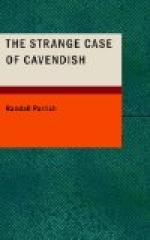She took it in her hand, and crossed the room, finding a seat beneath one of the bracket-lamps, but with her face turned toward the hall. It was just a single sheet of folded paper, not enclosed in an envelope, and had been torn across, so that the two parts barely held together. She stared at it for a moment, almost motionless, her fingers nervously moving up and down the crease, as though she dreaded to learn what was within. She felt that here was the key which was to unlock the secret of this strange crime. Whoever the man upstairs might prove to be—the real Cavendish or some impostor—this paper she held in her hands was destined to be a link in the chain. She unfolded it slowly and her eyes traced the written words within. It was a hasty scrawl, written on the cheap paper of some obscure hotel in Jersey City, extremely difficult to decipher, the hand of the man who wrote exhibiting plainly the excitement under which he laboured.
It was a message of warning, he was leaving New York, and would sail that evening for some place in South America, where he did not say. Love only caused him to tell her what had occurred. A strange word puzzled her, and before she could decipher it, voices broke the silence, followed by steps on the stairs. She glanced up quickly; it was Westcott returning, accompanied by a tall, rather slender man with a closely-trimmed beard. The two crossed the room, and she met them standing, the opened letter still in her hand.
“Miss Donovan, this is Frederick Cavendish—the real Frederick Cavendish. I have told him something of the trouble he has been to us all.”
The real Frederick Cavendish smiled down into her eyes, while he held her fingers tightly clasped in his own. She believed in him, liked him instantly.
“A trouble which I regret very much,” he said humbly. “Westcott has told me a little, a very little, of what has occurred since I left New York so hurriedly two months ago. This is the first I knew about it, and the mystery of the whole affair is as puzzling as ever.”
Her eyes widened wonderingly.
“You cannot explain? Not even who the dead man was found murdered in your apartments?”
“I haven’t the least idea.”
“Fred has told me all he knows,” broke in Westcott “but it only extends to midnight when he left the city. He was in his apartments less than ten minutes after his valet retired. He supposed he left everything in good order, with a note on the writing-table instructing Valois what to do during his absence, and enclosing a sum of money. Afterward, on the train, he discovered that he had mislaid the key to his safe but this occasioned no worry, as he had taken with him all the cash it held, and the papers were of slight importance.”
“But,” she broke in impatiently, “where did he go? How did he escape encountering Beaton and why did he fail to answer your message?”




